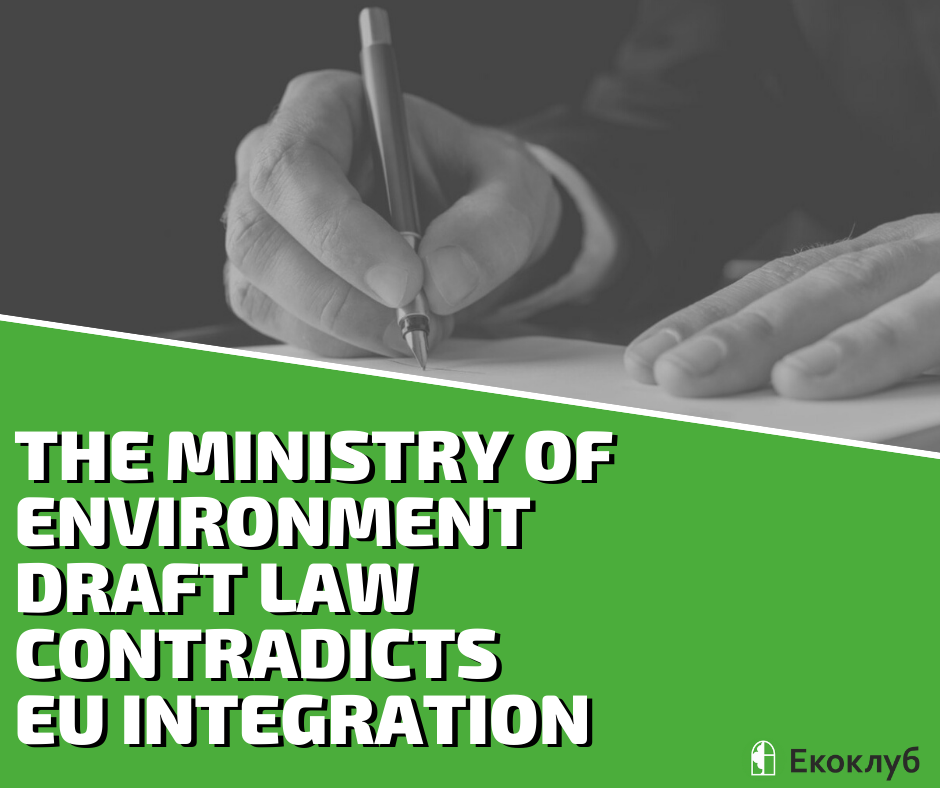On August 26, 2022 Ukraine’s Ministry of Ecology and natural resources published for public consultations the draft law “On changes to the law on EIA”. This draft proposes an array of profound changes to the effective law.
The suggested changes pose risks to the fulfillment of environmental requirements pertaining to Ukraine’s accession to the EU, because Ukraine needs not only to approximate EU acquis, but to introduce operable tools for its implementation. The Government and Parliament of Ukraine have to approach the changes to the legislation with a proper responsibility, as the changes are subject to EU acquis requirements and full compliance of changes must be ensured.
The suggested changes do not meet the EU acquis requirements and Ukraine’s obligations under the Association agreement.
The explanatory note states that “the draft law does not contain the articles that relate to Ukraine’s obligations in the area of EU integration”. Nevertheless, implementation of the Directive 2011/92/EU on the assessment of the effects of certain public and private projects on the environment is among the obligations included in the Association agreement. The directive is an important factor for the provision of an adequate environmental governance, particularly under the Aarhus convention, joined by Ukraine.
The analysis of the suggested changes indicates the following problem points for compliance with European legislation:
The involvement of other concerned authorities is among the requirements of the Directive 2011/92 EU. The involvement is obligatory, it should be prescribed by detailed law requirements and mustn’t bear characteristics of discretionary powers. Therefore, the suggested changes are not in line with Article 6, and Article 5, part 3 of the Directive on EIA. Besides that, the draft law does not require publication of outcomes of such consultations, which goes against Article 9 (1)(b); it also does not require informing the authorities about an adopted decision (art. 9(1)(a) of the directive). It’s worth mentioning that the actual law on EIA is also not in line with the directive regarding this issue.
The suggested changes totally remove the requirement to publish in media a notification about the planned activity, which is subject to EIA, and an announcement of a start of public consultations on an EIA report. Instead, the draft law suggests placing the announcement in at least three public places. This requirement is insufficient, as it does not ensure adequate informing of the public. Altogether, the changes do not meet the requirements of Art. 6(2) and 6(5) of the Directive 2011/92/EU.
The suggested changes significantly shorten the period for the provision of a conclusion on an EIA report – from 25 to 15 working days. We hold the opinion that the requirement is impossible to meet and it only aggravates the formal and procedural nature of the existing EIA system in Ukraine. It’s impossible to properly review an EIA report in such a short term.
While it does not go against the Directive, the absence of the reasons for rejection and negative conclusion on an EIA report is a serious flaw of the actual law. The draft law suggests including the list of reasons for rejection of a conclusion on an EIA report. On the other hand, the legal implications of (the means of) correcting the deviations prescribed by part 2 of this article do not comply with the foundations of the EIA procedure, which is an integral process and can’t begin midway. In contrast, the content of the part 2 Art. 91 leads to the conclusion that after the deviations are corrected (or with the aim of correcting certain deviations) the following EIA procedure is shortened.
EIA in its essence is an assessment tool that requires expert conclusions on the significance and negative effects of the impact, rather than its compliance with the law. What’s more, the Directive bases immediately on the key principles of primary law of the EU: precaution and prevention (see items 2 and 15 of the preamble). Therefore, such reasons for a negative conclusion do not meet the foundations of EU law and the Directive 2011/92/EU.
Approval of the changes will negatively impact the progress towards EU membership.
Approval of the changes will negatively impact the progress towards EU membership. The suggested changes do not bring closer but instead distance Ukraine from compliance with the European law and will not contribute to the positive EU assessment of the actual system in Ukraine. Therefore we call on authors of this bill to review the suggested changes regarding their compliance with the directive and to involve all stakeholders in the process.
Access complete text of the position:
The suggested changes to the EIA system is a setback for the progress of Ukraine towards EU integration (1552 downloads )Signatories:
NGO Ecoclub
NGO Ecoaction
NGO Black Sea women’s club Resource and analysis center “Society and Environment”











